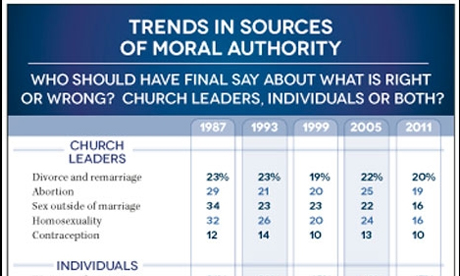Amid the scramble to gather new data ahead of next October’s synod on the family, a question arises: Will church officials incorporate the wealth of insights collected in recent decades by researchers inside and outside the US church?
In late October, the Vatican sent to national bishops’ conferences a preparatory document and questionnaire for the 2014 Synod of Bishops on the family with the directive to circulate them “as widely as possible.” The questions ask about topics like knowledge and acceptance of church teachings, family transference of the faith, marital issues (including natural law, divorce/annulments, and same-sex unions), and contraception.
Much attention has focused on how various bishops and dioceses would distribute the questionnaire, which NCR made public, and gather responses. While reform groups and lay organizations have joined the data collection push, valid research from social scientists already provides brushstrokes toward a portrait of the modern American Catholic family.
For example, NCR has sponsored a longitudinal study on American Catholic beliefs and practices with surveys conducted every six years since 1987. The most recent version, titled “Catholics in America,” appeared Oct. 28, 2011. Similar, extensive work has been conducted by the Public Religion Research Institute (PRRI), the Center for Applied Research in the Apostolate (CARA) at Georgetown University, and the Pew Research Center’s Religion and Public Life Project.
While not all questions posed by the Vatican fall under the scope of previously conducted studies, a wealth of information still exists.
Currently, Catholics in the United States number 78.2 million, about a quarter of the population. About 25 percent of U.S. Catholics attend Mass weekly. According to the NCR survey, more than half are of the post-Vatican II (born 1961-78) and millennial (born 1979-93) generations. A third are Hispanic. As of 2011, two-thirds have been married (54 percent currently, 69 percent of those validated by the church), and 10 percent live with a partner, while a fifth of respondents reported they have never married.
The synod survey first asks how Catholics understand (Question 1a) and accept (1b) family-related church teachings contained in the Bible, Gaudium et Spes, Familiaris Consortio and other documents. Though not specifically gauging comprehension of these texts, recent studies provide insight into U.S. Catholics’ familiarity with such teachings.
In its 2007 survey on marriage, CARA found 34 percent of Catholics reporting high familiarity with church teachings on marriage, and 37 percent somewhat familiar. The percentages jumped when examined through Mass attendance, what CARA identified as “a strong indicator of the general importance of Catholicism in a person’s life and of his or her level of commitment to living out the faith.” Among weekly attendees, 59 percent describe themselves as very familiar with marriage teachings.
Catholics showed little interest (30 percent) in further learning of marriage teaching, with CARA noting “perhaps because they are already relatively familiar with Church teaching on marriage.” At least a quarter expressed interest in learning more about commitment and fidelity; divorce, remarriage and annulments; and interfaith marriage. Just 19 percent were interested in further information about the church’s family planning teachings. The preferred medium for such information was print or online resources (40 percent) — almost twice as much as interpersonal interaction, whether in groups, retreats or conversations with their pastor.
For the most part, CARA reported that Catholics could accurately identify church teachings on marriage — it is a sacrament when between two baptized persons; openness to children is an essential part; considered good for individuals and the community — but other studies found that recognition did not necessarily equal adoption.
In the 2011 NCR survey, researchers pointed to a post-Humanae Vitae effect, where the Vatican’s rejection of contraceptives dented its moral authority, evident in the five surveys conducted since 1987. The latest figures show Catholics siding with personal conscience as the final decision-maker on the morality of remarriage without an annulment (47 percent), abortion (52 percent), nonmarital sex (53 percent), homosexual activity (57 percent) and the use of contraceptives (66 percent).
Further, Pew found in 2009 that unaffiliated former Catholics, when asked why they left their faith, cited unhappiness with teachings on abortion and homosexuality (56 percent), on birth control (48 percent, too strict for the vast majority), and on divorce and remarriage (33 percent).
At the end of Section 1, the Vatican asks what cultural factors have hindered reception of church teaching. Pew found about a third of Catholics said pop culture or civil law at least somewhat influenced their view of marriage, but more pointed to family experiences (two-thirds) and their faith (55 percent).
In two separate 2011 polls, the PRRI found familiarity a factor in opinions toward abortion or same-sex marriage: Among the 61 percent of Catholics who have a gay friend or family member, two-thirds favored legalizing same-sex marriage (up 11 percent from all Catholics), and more than half of the 60 percent of Catholics who know a woman who has had an abortion support its legalization in most cases. [Read More]
Source
NCR Online
Image: NCR Online
